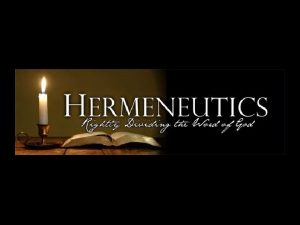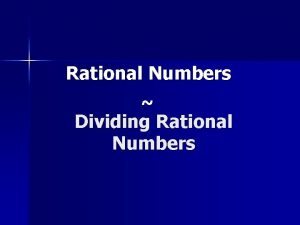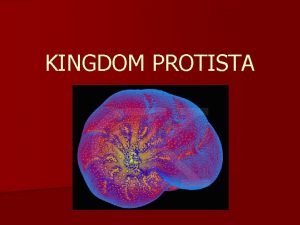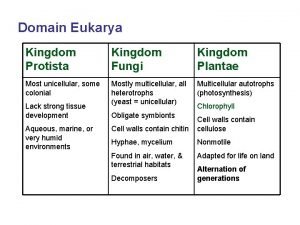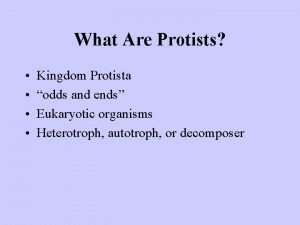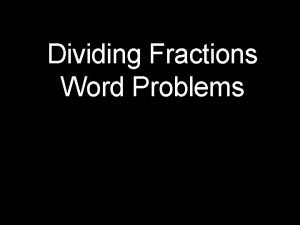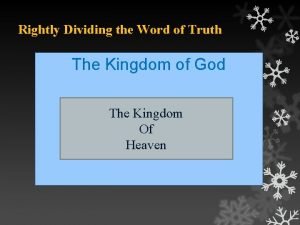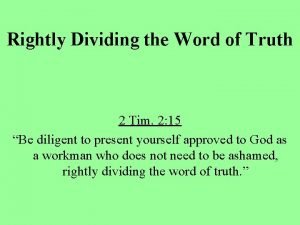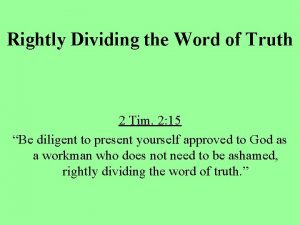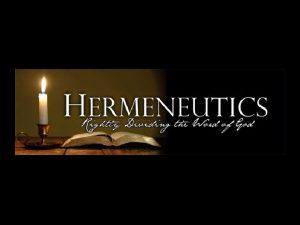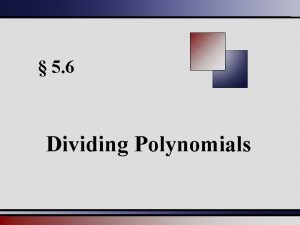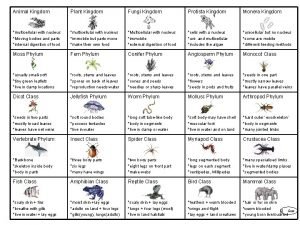Rightly Dividing the Word of Truth The Kingdom



























- Slides: 27

Rightly Dividing the Word of Truth The Kingdom of God The Kingdom Of Heaven

Rightly Dividing the Word of Truth The Kingdom of God The Kingdom Of Heaven Only Mathew: ”Kingdom of Heaven” – 33 x “Kingdom of God” – 5 x “Kingdom” 7 x “his”, “ Father’s”, “Thy” 5 x

Basic Doctrinal Division Calvinism • Eternal Security • Perseverance of the saints • “Experimental Predestinarians”

Basic Doctrinal Division Calvinism • Eternal Security • Perseverance of the saints • “Experimental Predestinarians” Arminianism • Only those that persevere to the end are saved

Basic Doctrinal Division Calvinism Arminianism • Eternal Security • Only those that Overcomers • Perseverance of • Eternal Securitypersevere to the saints • Secure Salvation Faith the end are • Distinction • “Experimental saved • Between: Predestinarisans” - Entering - Inheritance * Variation of Rewards

Concerns • Highly controversial material -Call to Acts 17: 11 • All are not equal in Heaven - All are equal in being “Justified”: declared not guilty: - Entering the Kingdom vs. Inheriting

Review of Basics • Eternal Security Secure Salvation Faith - The sufficiency of Christ • The Paradigm of Salvation

Which of these statements is correct according to Bible doctrinal truth? “I have been saved. ” “I am being saved, ” “I will be saved. ”

The Paradigm of Salvation • Justification (Past tense) - The gift from God of everlasting life received faith alone in Christ alone (John 3: 18)

The Paradigm of Salvation • Justification (Past tense) - The gift from God of everlasting life received by faith alone in Christ alone (John 3: 18, 5: 24) • Sanctification (Present tense) -A work in progress that involves the faith and the works of the believer

The Paradigm of Salvation • Justification (Past tense) - The gift from God of everlasting life received by faith alone in Christ alone (John 3: 18, 5: 24) • Sanctification -A (Present tense) work in progress that involves the faith and the works of the believer

• Glorification (Future tense) - The result of the previous aspects - All believers will be glorified (resurrected and given a body like Christ), but some will have more glory (i. e. reward) than others

The Paradigm of Salvation Past Tense: Separation from the Penalty of Sin Present Tense: Separation from the Power of Sin Future Tense: Separation from the Presence of Sin

The Paradigm of Salvation Past Tense: Separation from the Penalty of Sin Justification Present Tense: Separation from the Power of Sin Sanctification Future Tense: Separation from the Presence of Sin Glorification

Justification is for us: Sanctification is in us. Justification declares the sinner righteous: Sanctification makes the sinner righteous

Justification is for us: Sanctification is in us. Justification declares the sinner righteous: Sanctification makes the sinner righteous Justification removes the guilt and penalty of sin; Sanctification removes the growth and the power of sin

Review of Basics • Secure Salvation Faith -The Sufficiency of Christ • The Paradigm of Salvation • Paul’s Paranoia ?

What exactly was Paul’s Paranoia? What was Paul anxious about? His “Fear”

Romans 8: 15 -17 “…. if so be that we suffer with Him…. ” Always take notice of the footnotes or conditions

1 Cor. 9: 27 “…. I myself be… a castaway” What was he referring to?

Review of Basics

Let us study Paul, my friend Phil 3: 4 -14 • confidence in works • faith in qualifications • loss of accrued gain • new pursuit • press for the MARK What MARK? THE PRIZE!

I Cor. 3: 5 -15 • individual rewards (vs 8) • possibility of loss of reward (vs 15)

Review of Basics • Eternal Security -The Sufficiency of Christ • The Paradigm of salvation • Paul’s Paranoia? - Entering vs Inheriting

Review of Basics • Secure Salvation Faith -The Sufficiency of Christ • The Paradigm of Salvation • Paul’s Paranoia? - Entering vs Inheriting - Potential loss of inheritance

Partaking

 Rightly dividing the word of truth meaning
Rightly dividing the word of truth meaning Rightly dividing the word of truth dispensations
Rightly dividing the word of truth dispensations Old kingdom middle kingdom new kingdom
Old kingdom middle kingdom new kingdom Old kingdom middle kingdom new kingdom
Old kingdom middle kingdom new kingdom Roman empire
Roman empire Capital of egypt during the old kingdom
Capital of egypt during the old kingdom Multiplying and dividing rational numbers jeopardy
Multiplying and dividing rational numbers jeopardy Are protists eukaryotic
Are protists eukaryotic What do kingdom fungi and kingdom plantae share
What do kingdom fungi and kingdom plantae share Domain
Domain The odds and ends kingdom
The odds and ends kingdom Multiplying and dividing fractions word problems
Multiplying and dividing fractions word problems Division fraction word problems
Division fraction word problems I tell you the truth whoever hears my word
I tell you the truth whoever hears my word Greek word for kingdom of god
Greek word for kingdom of god Black death acrostic poem
Black death acrostic poem Hình ảnh bộ gõ cơ thể búng tay
Hình ảnh bộ gõ cơ thể búng tay Slidetodoc
Slidetodoc Bổ thể
Bổ thể Tỉ lệ cơ thể trẻ em
Tỉ lệ cơ thể trẻ em Gấu đi như thế nào
Gấu đi như thế nào Glasgow thang điểm
Glasgow thang điểm Alleluia hat len nguoi oi
Alleluia hat len nguoi oi Các môn thể thao bắt đầu bằng tiếng đua
Các môn thể thao bắt đầu bằng tiếng đua Thế nào là hệ số cao nhất
Thế nào là hệ số cao nhất Các châu lục và đại dương trên thế giới
Các châu lục và đại dương trên thế giới Công của trọng lực
Công của trọng lực Trời xanh đây là của chúng ta thể thơ
Trời xanh đây là của chúng ta thể thơ
